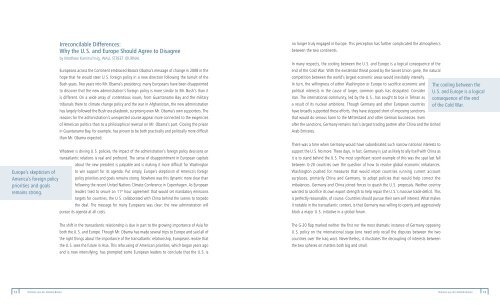Young Leaders - Atlantik-Brücke ev
Young Leaders - Atlantik-Brücke ev
Young Leaders - Atlantik-Brücke ev
Erfolgreiche ePaper selbst erstellen
Machen Sie aus Ihren PDF Publikationen ein blätterbares Flipbook mit unserer einzigartigen Google optimierten e-Paper Software.
Irreconcilable Differences:<br />
Why the U. S. and Europe Should Agree to Disagree<br />
by Matthew Karnitschnig, WALL STREET JOURNAL<br />
Europeans across the Continent embraced Barack Obama’s message of change in 2008 in the<br />
hope that he would steer U. S. foreign policy in a new direction following the tumult of the<br />
Bush years. Two years into Mr. Obama’s presidency, many Europeans have been disappointed<br />
to discover that the new administration’s foreign policy is more similar to Mr. Bush’s than it<br />
is different. On a wide array of contentious issues, from Guantanamo Bay and the military<br />
tribunals there to climate change policy and the war in Afghanistan, the new administration<br />
has largely followed the Bush-era playbook, surprising <strong>ev</strong>en Mr. Obama’s own supporters. The<br />
reasons for the administration’s unexpected course appear more connected to the exigencies<br />
of American politics than to a philosophical r<strong>ev</strong>ersal on Mr. Obama’s part. Closing the prison<br />
in Guantanamo Bay, for example, has proven to be both practically and politically more difficult<br />
than Mr. Obama expected.<br />
What<strong>ev</strong>er is driving U. S. policies, the impact of the administration’s foreign policy decisions on<br />
transatlantic relations is real and profound. The sense of disappointment in European capitals<br />
about the new president is palpable and is making it more difficult for Washington<br />
to win support for its agenda. Put simply, Europe’s skepticism of America’s foreign<br />
policy priorities and goals remains strong. Nowhere was this dynamic more clear than<br />
following the recent United Nations Climate Conference in Copenhagen. As European<br />
leaders tried to secure an 11th Europe’s skepticism of<br />
America’s foreign policy<br />
priorities and goals<br />
remains strong.<br />
hour agreement that would set mandatory emissions<br />
targets for countries, the U. S. collaborated with China behind the scenes to torpedo<br />
the deal. The message for many Europeans was clear: the new administration will<br />
pursue its agenda at all costs.<br />
The shift in the transatlantic relationship is due in part to the growing importance of Asia for<br />
both the U. S. and Europe. Though Mr. Obama has made s<strong>ev</strong>eral trips to Europe and said all of<br />
the right things about the importance of the transatlantic relationship, Europeans realize that<br />
the U. S. sees the future in Asia. This refocusing of American priorities, which began years ago<br />
and is now intensifying, has prompted some European leaders to conclude that the U. S. is<br />
no longer truly engaged in Europe. This perception has further complicated the atmospherics<br />
between the two continents.<br />
In many respects, the cooling between the U. S. and Europe is a logical consequence of the<br />
end of the Cold War: With the existential threat posed by the Soviet Union gone, the natural<br />
competition between the world’s largest economic areas would in<strong>ev</strong>itably intensify.<br />
In turn, the willingness of either Washington or Europe to sacrifice economic and The cooling between the<br />
political interests in the cause of larger, common goals has dissipated. Consider U. S. and Europe is a logical<br />
Iran. The international community, led by the U. S., has sought to box in Tehran as consequence of the end<br />
a result of its nuclear ambitions. Though Germany and other European countries of the Cold War.<br />
have broadly supported these efforts, they have stopped short of imposing sanctions<br />
that would do serious harm to the Mittelstand and other German businesses. Even<br />
after the sanctions, Germany remains Iran’s largest trading partner after China and the United<br />
Arab Emirates.<br />
There was a time when Germany would have subordinated such narrow national interests to<br />
support the U. S. No more. These days, in fact, Germany is just as likely to ally itself with China as<br />
it is to stand behind the U. S. The most significant recent example of this was the spat last fall<br />
between G-20 countries over the question of how to resolve global economic imbalances.<br />
Washington pushed for measures that would impel countries running current account<br />
surpluses, primarily China and Germany, to adopt policies that would help correct the<br />
imbalances. Germany and China joined forces to quash the U. S. proposals. Neither country<br />
wanted to sacrifice its own export strength to help repair the U. S.’s massive trade deficit. This<br />
is perfectly reasonable, of course. Countries should pursue their own self interest. What makes<br />
it notable in the transatlantic context, is that Germany was willing to openly and aggressively<br />
block a major U. S. initiative in a global forum.<br />
The G-20 flap marked neither the first nor the most dramatic instance of Germany opposing<br />
U. S. policy on the international stage (one need only recall the disputes between the two<br />
countries over the Iraq war). N<strong>ev</strong>ertheless, it illustrates the decoupling of interests between<br />
the two spheres on matters both big and small.<br />
12 Stimmen aus der <strong>Atlantik</strong>-<strong>Brücke</strong><br />
Stimmen aus der <strong>Atlantik</strong>-<strong>Brücke</strong> 13



